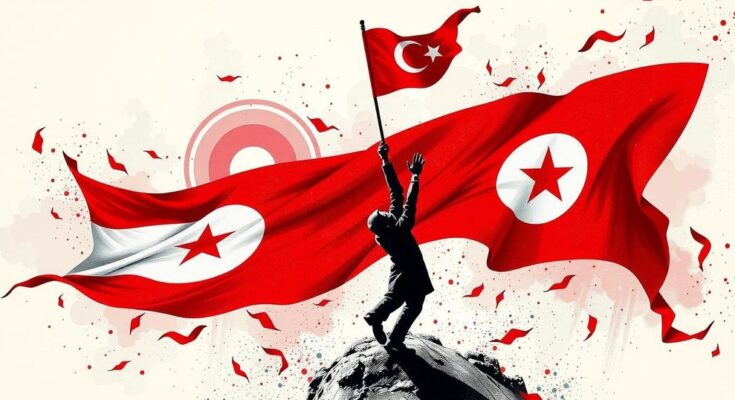Tunisia marks another anniversary of its revolution amidst political repression under President Kais Saied, transforming celebrations into suppressed demonstrations. This year, heightened hope arises from Syria’s recent victory over dictatorship, symbolizing resilience and inspiring Tunisians in their ongoing struggle for freedom and justice. As numerous opposition figures face persecution, the enduring spirit of the Arab Spring reflects the cyclical nature of revolutions and the persistent pursuit of dignity across the region.
As Tunisia commemorates another anniversary of its revolution, it reflects a profound sense of loss under President Kais Saied’s post-coup dictatorship. The once joyous celebrations of the 2011 uprising that ended Zine El Abidine Ben Ali’s regime have devolved into curtailed demonstrations and repression. Saied, once a proponent of the revolution, has disregarded the significance of January 14, treating it as an ordinary day. However, this year’s anniversary is tinged with renewed hope, spurred by the recent success of the Syrian revolution, which saw the ousting of dictator Bashar al-Assad after years of struggle. The Syrian experience serves as a source of solace and encouragement for Tunisians, who find inspiration in their resilience against tyranny.
The triumph of the Syrian people signifies a victory of the indomitable human spirit, reflecting a longing for freedom and dignity despite severe adversity. It exemplifies the lesson that brutal oppression cannot extinguish the collective desire for liberty. History teaches us that revolutions may meander and incur substantial costs, evolving in a cyclical manner rather than in a linear progression. The success in Syria should remind observers not to dismiss Tunisia’s revolutionary ambitions or those of the broader Arab world, as both struggles share interconnected narratives.
Despite the achievements made since Tunisia’s revolution, including efforts toward establishing an inclusive political system, numerous challenges persist: political deadlock, economic dissatisfaction, and counter-revolutionary sentiments threaten the democratic transition. On this anniversary, numerous political opposition leaders and critics of the regime remain imprisoned or subject to legal prosecution, showcasing the enduring resistance against reverting to past authoritarian practices. The collective resolve of these individuals reaffirms the continued relevance of the Arab Spring’s ideals.
As Tunisians rally on the 14th anniversary of their revolution, they carry a glimmer of hope ignited by the recent upheaval in Syria. It serves as a poignant reminder that the struggle for liberty, social justice, and democracy is arduous yet essential. Activists and citizens alike remain determined to reshape their future, envisioning a time when liberatory joy will echo not only in Syria but also across Tunisia and the Arab region. The lessons drawn from Syria’s journey resonate deeply throughout the Arab Spring, suggesting it is neither concluded nor forgotten; the aspirations for freedom remain alive.
The anniversary of Tunisia’s 2011 revolution marks a significant moment in the country’s history, celebrating a movement aimed at overthrowing dictatorship and advancing democracy. However, recent political developments, particularly the rise of Kais Saied and the rollback of democratic gains, have fostered a sense of foreboding among Tunisians. In parallel, the recent developments in Syria, where resistance has culminated in the ousting of a long-standing tyrant, highlight the broader regional struggle for freedom and its cyclical nature. Both nations, in their distinct circumstances, reflect the waves of the Arab Spring and the continuous fight against authoritarianism. The opposition faced by Tunisians today illustrates the fragility of democratic progress in the region.
In conclusion, the anniversary of Tunisia’s revolution serves as a sobering reminder of the ongoing battle for freedom and justice in the region. The stark contrast between Tunisia’s current struggle against authoritarianism and the recent success of the Syrian people provides a dual narrative of loss and hope. As the region continues to witness cycles of revolution and counter-revolution, the enduring spirit of the Arab Spring remains alive, propelling the quest for dignity, democracy, and a brighter future. Thus, Tunisians, inspired by Syria’s resilience, remain committed to their pursuit of liberation, underscoring that the path to freedom is both arduous and vital.
Original Source: www.middleeasteye.net




